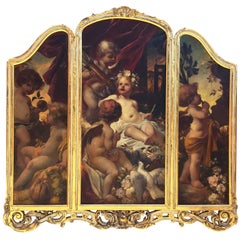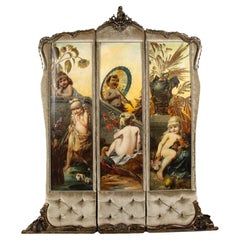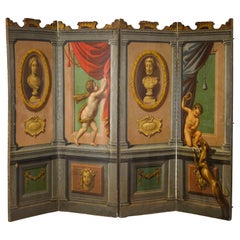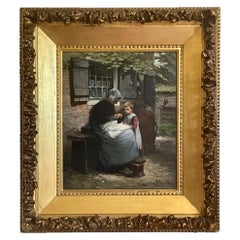Ferdinand Wagner II
Ferdinand Wagner II was the son of Passau Ferdinand Wagner Senior, a teacher at a vocational art school who began training him professionally at a young age. After traveling to Italy in 1867–68, he continued with his art studies at The Munich Academy of Arts led by Peter Von Cornelius and Julius Schnorr Von Carolsfeld. Wagner II was influenced by the Munich School of master painters and by his art teacher, Karl von Piloty, who had been teaching at the Munich Art Academy since 1856. Piloty’s approach to historical paintings was influenced by the French art academic Paul Delaroche and by the fine artworks by Rubens and the Venetians. After his return to Germany, he was commissioned to decorate the former the Tenormayer Wine Tavern in Munich, subsequently, he received numerous other commissions as a decorator. Wagner II’s wall paintings and ceiling frescos attracted the attention of the Munich City Hall and he was commissioned to decorate the cellar and at the German Theatre. He also decorated the dining room at The Drachenburg in the Königswinter on the Rhine, the Café of Roth and Luitpold in Munich and The Tivoli Restaurant in London. Between 1890–91, he commissioned numerous artworks for the Prince Bismarck Steamboat. In Passau, he created works at the town's City Hall. Between 1892 and 1916, he worked continuously decorating the Castle Ratibor by Roth where in 1894, he painted its main artwork The Triumph of Aphrodite. Amongst other works, in 1891 he decorated the facade at The Schwyz City Hall, in 1895 the Grand Hall ceiling fresco at the Castle Bueckeburg, in 1897 the decoration of the large dining hall at the Famous Munich Hofbräuhaus. In 1899, he was commissioned to decorate the tower hall of the newly built Hamburg City Hall. In Passau, Wagner II was awarded numerous honors where, in 1887, he was named an Honorary Citizen, Ferdinand-Wagner-Straße Street was named after him and the Ferdinand Wagner Hall at the Town's City Hall was named after him as well.
Late 19th Century German Rococo Revival Antique Ferdinand Wagner II
Canvas, Wood
19th Century German Belle Époque Antique Ferdinand Wagner II
Canvas, Upholstery, Giltwood, Paint
Late 18th Century Italian Neoclassical Antique Ferdinand Wagner II
Canvas
19th Century Dutch Other Antique Ferdinand Wagner II
Canvas, Giltwood
20th Century Spanish Mid-Century Modern Ferdinand Wagner II
Metal, Iron, Gold Leaf
Mid-19th Century Spanish Antique Ferdinand Wagner II
Canvas, Wood
2010s Italian Other Ferdinand Wagner II
Wood
Early 19th Century English Victorian Antique Ferdinand Wagner II
Canvas, Giltwood
19th Century Swedish Antique Ferdinand Wagner II
21st Century and Contemporary French Beaux Arts Ferdinand Wagner II
Ceramic
2010s Italian Other Ferdinand Wagner II
Wood
2010s Italian Organic Modern Ferdinand Wagner II
Metal, Aluminum, Brass, Nickel
2010s Italian Other Ferdinand Wagner II
Wood
Late 19th Century American Antique Ferdinand Wagner II
Canvas



